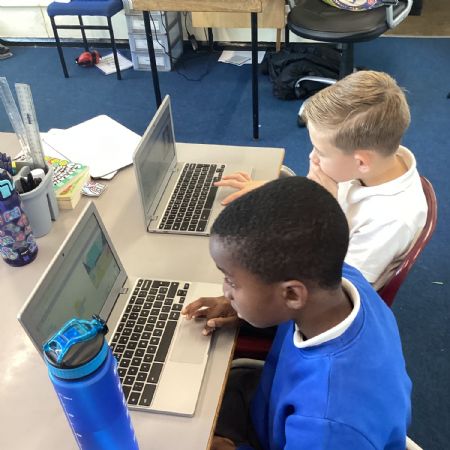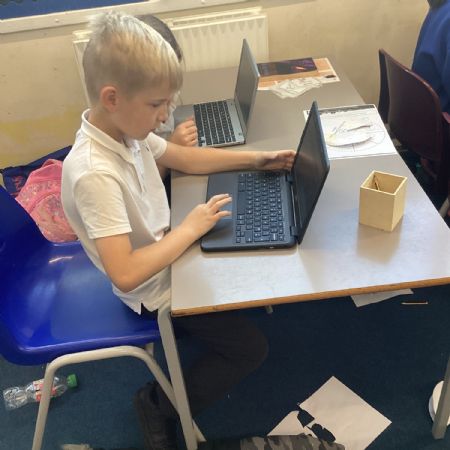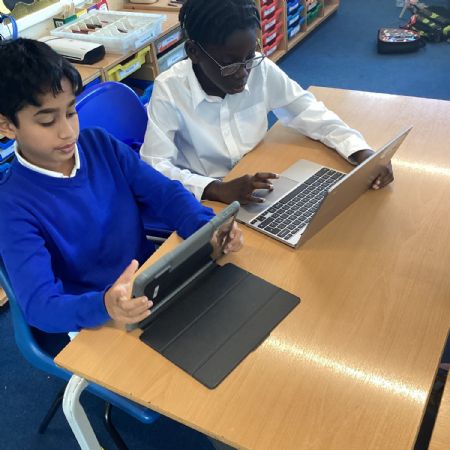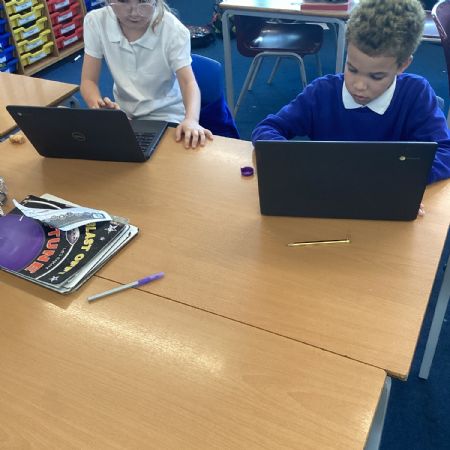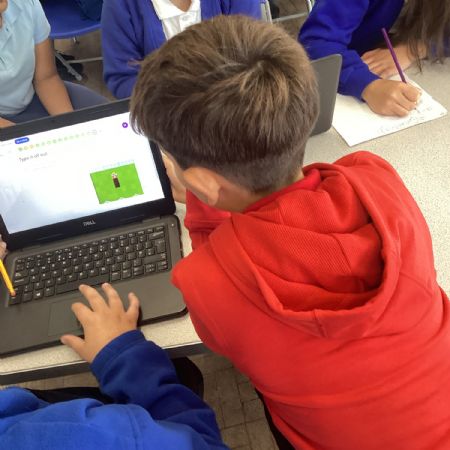Computing
Computing Vision
In an increasingly digital world, we believe all children should leave primary school with the confidence and skills to navigate technology effectively. At Rowdown Primary School, we equip our pupils with the ability to create, analyse, and share digital content, ensuring they become capable and responsible users of ICT. Just as handwriting is essential, so too is the ability to type and work efficiently with digital tools.
Computing is taught progressively, allowing pupils to build on prior learning each year. They develop key skills such as coding, debugging, and computational thinking, as well as learning to use a range of software and hardware. Logical reasoning, problem-solving, and creativity are embedded throughout, preparing children to adapt to new technologies in the future.
Online safety is at the heart of our approach. Pupils are taught to use technology responsibly, understanding how to stay safe, protect their privacy, and communicate respectfully online. Each year, we take part in Safer Internet Day, offering workshops and activities to reinforce key messages for both pupils and parents. Additionally, we share a weekly e-safety tip in our school newsletter, helping families stay informed about the latest guidance on staying safe online.
Our computing curriculum ensures that children not only gain technical skills but also develop transferable knowledge they can apply across the wider curriculum and in real-world situations. By the time they leave Rowdown, they will be equipped with the confidence and capability to thrive in an ever-changing digital landscape.
Mr Sudev
Discrete and systematic teaching of Computing
The core of computing is computer science, in which pupils are taught the principles of information and computation, how digital systems work, and how to put this knowledge to use through programming. During their time at Rowdown our children should acquire and develop the skills associated with computer science in order to:
• design, write and debug programs that accomplish specific goals;
• use logical reasoning to explain how algorithms work and detect and correct errors in algorithms and programs;
• be able to use technology safely, respectfully and responsibly; recognise acceptable/unacceptable behaviour; identify a range of ways to report concerns about content and contact;
• acquire and refine the techniques e.g. saving, copying and checking the accuracy of input and output needed to use ICT.
As a consequence of our vision and values, we aim to teach our children to be responsible, confident and creative users of information and communication technology. We achieve this by having an inclusive program of teaching where all children can access the curriculum. Some of the skills we teach are listed below:
• basic computing skills – no technology can be helpful for learning if it can’t be used productively, confidently or quickly enough. Basic Computing skills include typing/keyboard/mouse/ organisation skills.
• Internet and e-safety skills – many of our children have an internet connected PC at home. Using the resources from the ThinkUKnow website, we take part annually in Safer Internet Day in February as well as incorporate specific e-safety teaching in the Computing curriculum.
• Key skills - higher order skills that equip learners for life in the 21st century, which include problem solving, information processing, research and enquiry
In addition, we aim to provide pupils with opportunities to use Computing equipment and software/web technologies to support a number of practical learning activities such as researching and creating multimedia content using a range of software packages as well as effective storage and retrieval of information through our secure ‘pupil share’ network.
Cross curricular links
At Rowdown, use of Computing is also embedded in other areas of learning. As children and teachers have access to laptops and tablet computers in the classroom, we are able to integrate Computing as part of our lifelong learning and everyday life. Cross-curricular links are made with other relevant topics of study. Computing has deep links with mathematics, science, and design and technology, and so wherever possible, it is used by children and staff to develop basic skills for enjoyment and research. In addition, ICT is used to support individual learners through targeted programs such as Lexia and Times Tables Rock Stars, being programs to which our school has subscribed.
Examples of Work yr5 and yr6







Websites to support learning in Computing
Online Safety:
https://www.thinkuknow.co.uk/parents/
https://www.parents.parentzone.org.uk/
Programming:
https://code.org/ (use child’s .306 login)
Digital Literacy:
https://www.bbc.co.uk/bitesize/topics/zf2f9j6/articles/z3c6tfr (BBC Dance Mat Typing)
https://www.busythings.co.uk/lgfl-login/ (use child’s .306 login)

